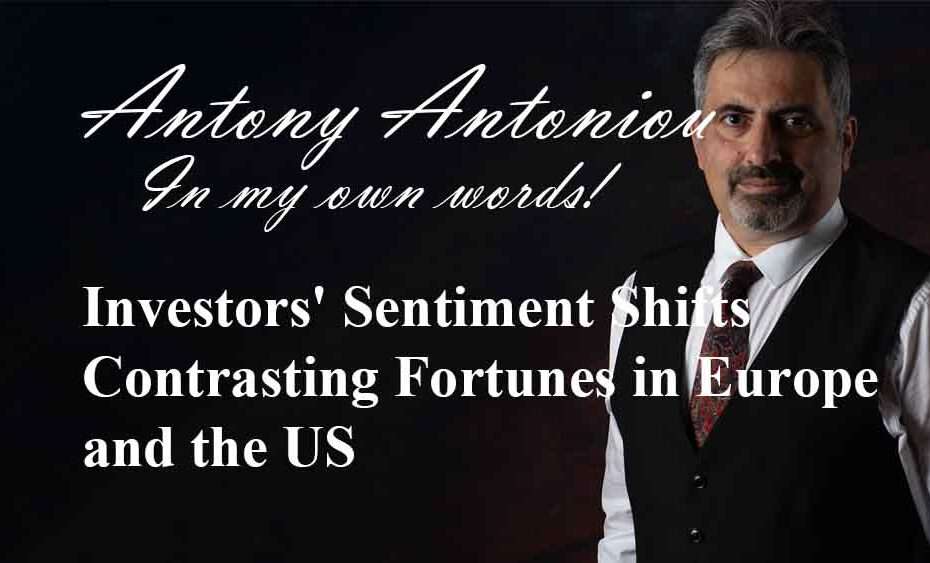Investors’ Sentiment Shifts – Contrasting Fortunes in Europe and the US
In the realm of financial markets, sentiment can sway like a pendulum, and currently, the pendulum is swinging with stark contrasts on opposite sides of the Atlantic. Investors are increasingly casting skeptical glances toward Europe’s economic prospects, revealing a growing divergence from the prevailing optimism about a “soft landing” in the United States.
**Euro’s Slide and Stalling European Shares**
Over the past couple of weeks, notable shifts have marked the changing sentiment. The Euro has weakened in comparison to the US Dollar, and the upward trajectory of European share prices earlier this year has seemingly hit a plateau. Meanwhile, German government bonds, often seen as a safe haven during turbulent times, have been gaining value.
These fluctuations in market indicators are sending a clear message – fund managers are gaining confidence in the belief that economic indicators within the Eurozone are exhibiting signs of weakening. This trend is fueled by the backdrop of increasing borrowing costs. On the other side of the ocean, the US economy appears to be displaying resilience, even in the face of its most stringent interest rate environment in over two decades.
**Differing Economic Data: US Resilience and European Struggles**
A closer look at recent economic data paints an even more divergent picture. The US economy outperformed expectations by growing at an annualized rate of 2.4% in the second quarter. The preferred inflation indicator of the US Federal Reserve cooled more than anticipated in June, bolstering hopes that the rate-raising cycle might be drawing to a close. In stark contrast, Europe finds itself teetering on the brink of a possible recession. Notably, services inflation in the Eurozone skyrocketed to a record 5.6% in July.
This stark contrast stems from a multitude of factors, including the impact of geopolitical events. Analysts highlight that the US interest rate hikes have been more effective in curbing inflation than their European counterparts. Furthermore, the ongoing geopolitical upheaval caused by Russia’s invasion of Ukraine has substantially disrupted food and energy supplies in Europe, contributing to the higher inflation rates.
**European Equities’ Rollercoaster Ride**
The year commenced with an unexpected surge in European equity markets, confounding predictions of a decline. However, this momentum has hit a snag as the second-quarter earnings season unfolds. Companies listed on the Stoxx Europe 600 index are poised to deliver their steepest drop in quarterly profits since the early days of the Covid-19 pandemic. In comparison, US companies within the S&P 500 have reported a much milder year-on-year decline in earnings per share.
This shift has led to a widening gap between European and US share prices. The S&P 500 has enjoyed a nearly 20% surge this year, partly due to the buoyancy surrounding artificial intelligence, a sector predominantly led by US firms.
**Conflicting Views on Economic Outlook**
Tim Murray, a multi-asset capital markets strategist at T Rowe Price, encapsulated this sentiment: “If you look at the equity valuations, they’ve been much higher in the US than in Europe and the rest of the world for quite some time. There was a little bit of narrowing, and now that’s widened back out. In the US, the narrative is we’re going to get the soft landing and avoid recession, whereas I think in Europe, there’s still a lot of doubt about that.”
This skepticism is echoed across currency and bond markets. The Euro has lost 2.6% of its value against the US Dollar since mid-July. Simultaneously, the gap between US and German 10-year government bond yields has reached its highest point this year. The appeal of European bonds, especially German Bunds, as a safe haven during a potential European recession is evident.
**Investors’ Defensive Maneuvers**
Kevin Thozet, a member of the investment committee at Carmignac, shed light on this shift, noting that Germany, Europe’s economic powerhouse, seems to be facing the brunt of economic weakening. In response, investors have diverted their focus toward German government bonds, seeking refuge should a full-fledged European recession unfold.
The trend is also reflected in the choices made by non-US investors. Non-US investors have divested approximately $50 billion in US Treasuries since the year’s commencement. In contrast, German Bunds have attracted nearly $4 billion in net inflows from non-eurozone investors over the same period.
**Optimism Amidst Challenges: The Case of UK Government Bonds**
The appeal of government bonds isn’t confined to Germany. UK government bonds have garnered investor interest in recent weeks. The anticipation of assertive rate hikes by the Bank of England to address the UK’s significant inflation problem has driven this interest. The perception is that these bonds could provide a haven in times of economic uncertainty and potential recession.
**Corporate Bond Pricing: A Reflection of Market Confidence**
The pricing of corporate bonds further underscores the growing optimism toward the US compared to Europe. Lowly-rated US companies issuing bonds are experiencing a premium near its lowest point in 16 months. In contrast, Eurozone junk bond spreads remain comparatively broader, reflecting a more cautious stance among investors.
**Final Thoughts: A Tale of Two Economies**
In summation, the financial arena is currently witnessing a compelling narrative of divergence between Europe and the US. Investors are increasingly expressing concerns about Europe’s economic trajectory, influenced by weakening indicators and apprehensions about policy decisions. On the other hand, the US economy stands on the precipice of a “soft landing,” exhibiting robust growth and controlled inflation. As the year unfolds, these distinct trends will continue shaping investor strategies and market dynamics on both sides of the Atlantic.

